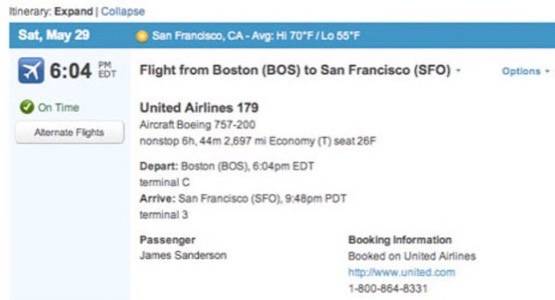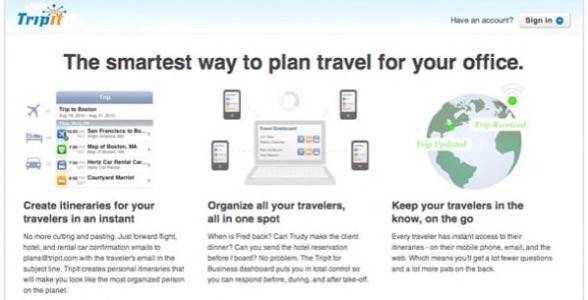In January of this year, mobile travel management app TripIt was acquired for up to $120 million by Concur, a company founded in 1993 that provides “integrated expense and travel management solutions.” TripIt, founded in late 2006, was one of my favorite ‘web 2.0’ apps. At the end of 2007, ReadWriteWeb named it one of 10 Semantic Apps to Watch. From the early days, TripIt had managed to pair its sophisticated technology with an easy to use interface. The back end was technological fairy dust, but for the user it was almost deceptively simple. As I described the app in 2007: “you forward incoming bookings to [email protected] and the system manages the rest.”

Last month in Seattle I met up with TripIt co-founder Scott Hintz and Concur co-founder Michael Hilton (currently Executive VP, Worldwide Marketing). I was most interested to find out how a trendy consumer-focused travel app found its way into the more rigid, paperwork ridden world of corporate travel management – and how it’s faring.
Why Concur Bought TripIt
Prior to approaching TripIt, Michael Hilton told me, Concur regarded the web 2.0 app as representing a sea change in the business travel industry. Mainly because TripIt was an application that was native to the smartphone. According to Hilton, who has been in the travel solutions industry for well over 15 years now, the smartphone has changed the dynamics of how people travel on business.
The innovation of TripIt, in the eyes of Concur’s management, was that it gave travelers power. They felt that the app could be used to manage both personal and business trips. The idea behind the acquisition was that TripIt would enable Concur’s customers to consolidate their travel data.

TripIt Was Already Eyeing Business Travel Market
The TripIt team had foreshadowed (or invited) the interest of Concur by launching a business offering in August of last year. Ostensibly this was a move designed to increase its revenue. Although the cynical amongst you might suggest it was to make TripIt an attractive acquisition target for the likes of Concur.
Regardless, it was probably a necessary move from a revenue point of view. Because although the consumer version of TripIt had a premium version for regular travelers, there was stiff competition in the consumer space from the likes of Dopplr, KAYAK and WorldMate.
So other than the obvious motivator of a big pay day, what attracted TripIt to Concur? TripIt co-founder Scott Hintz told me that from day one, TripIt was used by frequent travelers – which he said were mostly small or large business people. He admitted that it took some time for TripIt to recognize that in addition to its popular consumer offering, it could also offer benefits to employers.
In particular, Hintz told me, TripIt had a lot of requests from its users to create small business services. For example enabling office assistants, travel coordinators and others to manage the travel of other people in TripIt.
So while TripIt started out as a way to manage personal trips, the product was eventually extended to organize the trips of other people – typically in a business context.
TripIt is also now extending onto other devices; an an iPad app was launched in May.

Do You Concur With Concur Acquisition?
Much of the work currently happening between TripIt and Concur is in integrating the two services together. In May, it was announced that trips booked in Concur would be automatically copied into TripIt. The reverse data transfer (TripIt Pro to Concur) was announced at the end of June.
Overall, the acquisition by Concur was undeniably a great deal for TripIt. It got cash, stock in a larger, more stable company, and opportunities to flesh out its consumer app into a ‘grown up’ business one.
For Concur, it remains to be seen whether the bigco can successfully integrate a consumer-focused app into its heavily business-focused solutions. But as we all know, it’s a business world increasingly dominated by online – and increasingly mobile – services. Concur couldn’t have picked a better web 2.0 app in the consumer travel market, so at the very least it has smart new employees, access to sophisticated TripIt customers, and some very whizzy technology.
What do you think, was the deal a good one for both companies? What about for consumers?

















